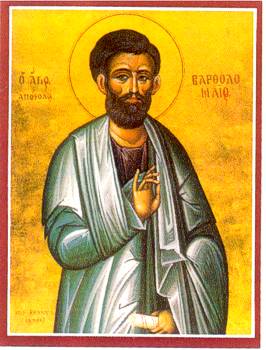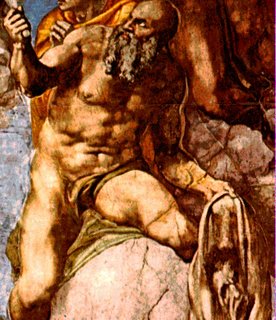MATTHEW, also called Levi, a son of Alpheus, and brother of the holy apostle James the Less, was a receiver in the Roman custom-house on Lake Tiberias. Such officers were hated by the Jews for their injustice, and were called publicans, or public sinners. While he was sitting at the receipt of custom he was called by Christ to be one of His disciples, and immediately leaving his lucrative office and all that he had, followed Him. On account of his distinguished zeal he was afterwards received into the number of the apostles. After the descent of the Holy Ghost he remained in Judea, preached the Gospel, wrote the passion of Our Lord as coutained in his gospel, and lived strictly in the fear of God. At a later day he travelled through Persia, Ethiopia, and other countries. At last he was killed at the altar, by command of King Hutacus, for opposing his marriage with the Princess Iphigenia, who, by Saint Matthew's direction, had vowed to God perpetual virginity. His holy remains were brought to Salermo in the tenth century. Thus may great sinners become great saints by following faithfully, like Saint Matthew, the voice of God.
At the Introit of the Mass the Church sings:
"The mouth of the just shall meditate wisdom, and his tongue shall speak judgment; the law of God is in his heart."
Glory be to the Father, and to the Son, and to the Holy Ghost. As it was in the beginning, is now, and ever shall be, world without end. Amen.
Prayer
May we be assisted, O Lord, by the prayers of the blessed apostle Matthew, that what of ourselves we are unable to obtain may be given to us by his intercession. Through Our Lord Jesus Christ, Amen.
Epistle: Ezechiel 1:10-14
The likeness of the face of the four living creatures: the face of a man, and the face of a lion on the right side of all the four, and the face of an ox on the left side of all the four, and the face of an eagle over all the four. And their faces, and their wings were stretched upward; two wings of everyone were joined, and two covered their bodies, and everyone of them went straight forward; whither the impulse of the spirit was to go, thither they went, and they turned not when they went. And as for the likeness of the living creatures, their appearance was like that of burning coals of fire, and like the appearance of lamps. This was the vision running to and fro in the midst of the living creatures, a bright fire, and lightning going forth from the fire. And the living creatures ran and returned like flashes of lightning.
Gospel: Matthew 9:9-13
At that time Jesus saw a man sitting in the custom-house, named Matthew; and He saith to him: Follow Me. And he rose up and followed Him. And it came to pass as He was sitting at meat in the house, behold many publicans and sinners came, and sat down with Jesus and His disciples. And the Pharisees seeing it, said to His disciples: Why doth your master eat with publicans and sinners? But Jesus hearing it, said: They that are in health need not a physician, but they that are ill. Go then and learn what this meaneth, I will have mercy and not sacrifice. For I am not come to call the just, but sinners.
Explanation
This gospel teaches us:
That when God calls we should obey at once, lest, by not giving heed to His voice, He should cease to call us, or withdraw from us His grace.
To forsake the occasions of sin; as Saint Matthew not only left the place where he sinned, but abandoned entirely the very house and office which had led him into sin.
That we should not only cease to sin, but, like Saint Matthew, should follow Christ in poverty, humility; meekness, patience, if we would enter the kingdom of God.
Prayer
O holy apostle, who hast made ready for us a glorious feast in thy gospel, pray for me that thy gospel may be in truth food for my soul; pray that in it I may devoutly consider the life, virtues, passion and death of Jesus Christ, that I may faithfully follow, in all things, thy words, written by inspiration of the Holy Ghost, and by the operation of the same Spirit may be able to exclaim: "How sweet are thy words to my palate I more than honey to my month."
-- Goffine's Devout Instructions

![[]](http://saints.sqpn.com/gdi234.gif)





